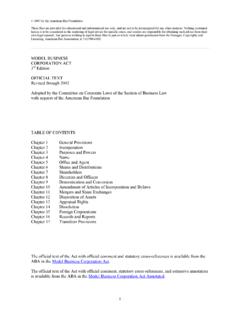Transcription of UNDERSTANDING ADMINISTRATIVE LAW - LexisNexis
1 0001 VERSACOMP ( ) COMPOSE2 ( ) 09/04/03 (10:21). NEW LAW SCH. Front Matter SAMPLE for PERFECTBOUND Pubs J:\VRS\DAT\00878\ --- --- POST 1. UNDERSTANDING . ADMINISTRATIVE LAW. FOURTH EDITION. By William F. Fox, Jr. Professor of Law The Catholic University of America 0002 VERSACOMP ( ) COMPOSE2 ( ) 09/04/03 (10:21). NEW LAW SCH. Front Matter SAMPLE for PERFECTBOUND Pubs J:\VRS\DAT\00878\ --- --- POST 11. This publication is designed to provide accurate and authoritative information in regard to the subject matter covered. It is sold with the UNDERSTANDING that the publisher is not engaged in rendering legal, accounting, or other professional services. If legal advice or other expert assistance is required, the services of a competent professional should be sought. LexisNexis and the Knowledge Burst logo are trademarks of Reed Elsevier Properties Inc, used under license.
2 Matthew Bender is a registered trademark of Matthew Bender Properties Inc. Copyright 2000 Matthew Bender & Company, Inc., a member of the LexisNexis Group. All Rights Reserved. No copyright is claimed in the text of statutes, regulations, and excerpts from court opinions quoted within this work. Permission to copy material exceeding fair use, 17 107, may be licensed for a fee of 10 per page per copy from the Copyright Clearance Center, 222 Rosewood Drive, Danvers, Mass. 01923, telephone (978) 750-8400. ISBN#: Library of Congress Cataloging-in-Publication Data Fox, William F. UNDERSTANDING ADMINISTRATIVE Law/William F. Fox, Jr. 4th ed. p. cm. (Legal text series). Includes bibliographical references and index. ISBN 0 8205 4727 1. 1. ADMINISTRATIVE law United States. 2. ADMINISTRATIVE procedure United States. I. Title. II. Series. 2000. '06 dc21. 00-056429.
3 Editorial Offices 744 Broad Street, Newark, NJ 07102 (973) 820-2000. 201 Mission St., San Francisco, CA 94105-1831 (415) 908-3200. 701 East Water Street, Charlottesville, VA 22902-7587 (804) 972-7600. ( ). Chapter 1, introduction , is reproduced from UNDERSTANDING ADMINISTRATIVE Law, Fourth Edition, by William F. Fox, Jr., Professor of Law, The Catholic University of America. Copyright 2000 Matthew Bender & Company, Inc., a member of the LexisNexis Group. All rights reserved. A user is hereby granted the right to view, print or download any portion of this sample chapter, so long as it is for the User's sole use. No part of this sample chapter may be sold or distributed by the User to any person in any form, through any medium or by any means. 0001 VERSACOMP ( ) COMPOSE2 ( ) 09/19/03 (11:28). J:\VRS\DAT\00878\ --- --CTP READY-- 2/21 --- POST 1 1/1. introduction introduction [A] Overview of ADMINISTRATIVE Law In the broadest sense, ADMINISTRATIVE law involves the study of how those parts of our system of government that are neither legislatures nor courts make decisions.
4 These entities, referred to as ADMINISTRATIVE agencies, are normally located in the executive branch of government and are usually charged with the day to day details of governing. Agencies are created and assigned specific tasks by the legislature. The agencies carry out these tasks by making decisions of various sorts and supervising the procedures by which the decisions are carried out. For example, Congress has charged the federal Social Security Administration (SSA) with the administration of the nation's social security program. Under that mandate, SSA does two things: (1) it makes general social security policy (within the terms of the statute, of course ) and (2) it processes individual applications for, and terminations of, social security benefits. Affected persons who disagree with the agency's decisions on either the substance of the social security program or the procedures under which that program is implemented and whose grievances are not resolved within the agency are permitted to take their dispute into federal court for resolution.
5 Occasionally, aggrieved persons return to the legislative branch in an attempt to persuade Congress to alter the statute under which the social security program functions. This brief outline is the basic model for the American ADMINISTRATIVE process; and whether you are studying federal ADMINISTRATIVE law, a state ADMINISTRATIVE system, or even a single ADMINISTRATIVE agency, the process of decision making is likely to be similar, even when the missions of the agencies differ. It is the unifying force of the ADMINISTRATIVE process in 1 (Pub. 878). 0002 VERSACOMP ( ) COMPOSE2 ( ) 09/19/03 (11:28). J:\VRS\DAT\00878\ --- --CTP READY-- 2/21 --- POST 14 1/1. 2 UNDERSTANDING ADMINISTRATIVE LAW dramatic contrast to the wide variety of substantive problems with which agencies deal that has persuaded most ADMINISTRATIVE law professors to concentrate on agency procedure rather than agency substance.
6 Accordingly, most contemporary ADMINISTRATIVE law courses analyze the manner in which matters move through an agency, rather than the wisdom of the matters themselves. In other words, the manner in which the federal Department of Transportation decided to impose a passive restraint system on automo- bile manufacturers is a fascinating case history of the ADMINISTRATIVE process, irrespective of anyone's personal position on the wisdom of air bags versus seat belts. Recognizing that the focus of most ADMINISTRATIVE law courses is on how decisions are made (rather than what those decisions are) should help you more readily understand the themes of the typical course in ADMINISTRATIVE law. 1. [B] Approaches to the Study and Practice of ADMINISTRATIVE Law ADMINISTRATIVE law can be approached in much the same fashion as many other law school courses. If you regard the field merely as a collection of discrete legal doctrines, it may make a great deal of sense simply to memorize various general principles, to apply those principles to a final examination or a bar examination, and then forget about the topic.
7 This book can be used in that fashion. A more profitable approach, however, to truly UNDERSTANDING ADMINISTRATIVE law and for practicing ADMINISTRATIVE law after your admission to the bar is to keep two questions in mind from the beginning: (1) What are the rules of the game, both substantive and procedural? and (2) How may I best represent my client before an ADMINISTRATIVE agency? Thinking through the twin issues of doctrine and the application of that doctrine through the lawyering process will make you a much better lawyer, even if it doesn't necessarily have an immediate payoff in your law school course or on the bar examination. 2. The ADMINISTRATIVE law course will become less fuzzy if you keep in mind a few more fundamentals. First, under our constitutional system, agencies are creatures of the legislature. They do not spring up on their own, and they cannot be created by courts.
8 Agencies function only insofar as a 1 One respected casebook disagrees with this approach and postulates that ADMINISTRATIVE law can be properly understood only if one studies an individual agency in depth, both substantively and procedurally. Glen O. Robinson, Ernest Gellhorn, & Harold H. Bruff, THE. ADMINISTRATIVE PROCESS (4th ed. 1993). 2 ADMINISTRATIVE law questions on the bar examination tend to be very much like law school examination questions. Practitioners will find additional hints on practicing before federal agencies in William Fox, Some Considerations in Representing Clients Before Federal Agencies, Law Practice Notes (Barrister Magazine, ABA) 21 26 (Summer, 1981). (Pub. 878). 0003 VERSACOMP ( ) COMPOSE2 ( ) 09/19/03 (11:28). J:\VRS\DAT\00878\ --- --CTP READY-- 2/21 --- POST 18 3/3. introduction 3. legislature has given them the authority to function.
9 That authority may be exceptionally broad ( , telling an agency to regulate railroads by applying the standard of public convenience and necessity ) or incredibly narrow ( , when Congress sets the specific income levels and other criteria for those persons who qualify for certain government benefits; or when Congress passes a Coal Mine Safety and Health Act, containing provisions that tell mine operators what size of mine roofing bolts to install). Federal ADMINISTRATIVE agencies are typically endowed with broad, general powers. By contrast, state legislatures often enact far more detailed agency statutes because of a lingering reluctance to give state agencies unfettered power. For example, the Nebraska legislature once enacted a statute prescribing the thickness of the metal walls in milk cans, presumably because the legislature did not trust the relevant ADMINISTRATIVE agency to make a sound decision on this issue.
10 This kind of statutory detail frequently signals a legislature's distrust with one agency in particular, or, possibly, with the ADMINISTRATIVE process in general. It is much less common for the United States Congress to get bogged down in the minutiae of administering a particular federal regulatory program because Congress tends to have more confidence in the federal agencies. Whatever form a new ADMINISTRATIVE agency takes, the legislature must enact a statute creating the agency. This statute, sometimes called an agency's organic act but more frequently referred to as an agency's enabling act, is the fundamental source of an agency's power. This principle that the legislature creates agencies and sets limits on their authority should be regarded as cardinal rule number one of ADMINISTRATIVE law. Far too many people in law school and, on occasion, even experienced practitioners, lose sight of this fundamental principal.









